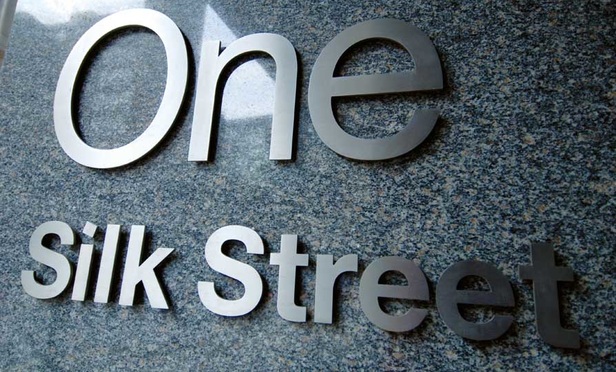Linklaters launches key client committee to 'coalesce the force' of the firm
Banking head Tony Bugg chairs new committee as Moore continues strategy roll out
September 15, 2017 at 08:53 AM
5 minute read

Linklaters has launched a client committee chaired by banking head Tony Bugg to coordinate the work it does for its biggest key clients and look for new opportunities.
The committee was established earlier this year by managing partner Gideon Moore, who describes it as "one of the cornerstones" of the firm's new strategy.
The committee will identify clients or groups of clients that are important to the firm and channel the firm's resources towards them. This could either be in terms of secondments, marketing efforts or expanding the work that Linklaters does for a client into more jurisdictions.
Moore said: "The reason I put together the [new] client committee is to make sure we have a group of driven, client-oriented partners and directors who are able to coalesce the force of Linklaters, so that we are able to focus on opportunities to service clients both now and in the future."
Another partner said the committee is looking at areas of significant growth for the firm and selecting clients the firm should prioritise.
"Like most firms, we already have a key client programme – this will be a shorter list and more targeted," the partner said.
Clients looked at by the committee will either be clients that the firm already does a lot of work with, or large organisations that present further opportunities. It could also consider groups of clients in a particular sector, which has been identified as an area for future growth.
The committee also has a remit to improve Linklaters client service in general, by better connecting offices, practices and teams and codifying best practice.
The partner said: "The scale of Linklaters is an advantage but sometimes it can be difficult getting everyone to pull together, this is about harnessing that scale".
Bugg was appointed head of banking in 2016, succeeding Moore on his elevation to managing partner. He was previously head of restructuring and insolvency and has worked on a number of high-profile matters, including leading Linklaters' team advising PwC on the long-running and lucrative administration of Lehman Brothers International (Europe).
Others on the committee include the firm's head of corporate Aedamar Comiskey, global head of client sectors Sarah Wiggins and chief marketing officer Frank Mellish, who joined Linklaters in April from Deloitte, where he was Australian head of marketing. There are also representatives from the firm's offices in Europe, the US and Asia.
It is not clear which of the firm's existing key clients will be looked at by the committee. According to Adviser Rankings' latest research, Linklaters currently acts for 18 FTSE 100 clients including mining giants Anglo American and Glencore, oil major BP, banks HSBC, Barclays and Lloyds Banking Group and energy companies National Grid and Centrica.
The introduction of a client committee is part of Moore's new strategy for the firm, which he launched at the partner conference in Monaco in April, following a wide-ranging consultation.
Other changes included in the new strategy include scrapping performance reviews and individual partner targets in order to try and foster collaboration by encouraging partners to work together. The strategy is intended to develop a more entrepreneurial culture at Linklaters and to break down silos and internal barriers within the firm.
Moore said: "We want to make sure that we are able to deliver team Linklaters to our client base, by continuing to ensure that whatever internal barriers and divisions may or not be around are removed, so that we as a collegiate and unified team can deliver the best team and the best service."
The strategy is being rolled out through the firm's various divisions, with partner groups tasked with adapting it to their practice area.
In the corporate practice, for example, a group of partners have looked at different areas of the business and types of clients and divided up responsibility for individual areas.
One corporate partner said: "It sounds like I have drunk the Kool-Aid but it feels like a strategy that is sufficiently high-level but can be made relevant for the day-to-day stuff.
"We had a big chart, like a mind-map, and as you go through it has the strategy stuff at the centre then that branches out to a whole range of products types like IPOs and private M&A, geographies and client types like corporate or private equity clients or FTSE 250 companies or banks.
"In each of those we have broken the different areas into sub-headings then somebody will take the lead role in relation to, for example, infrastructure funds, private M&A, China, energy or pro bono, or whatever it might be.
"There are 40 or so of us; your names are against a number of them as a leading partner or secondary partner."
Linklaters grew its revenue by almost 10% in the 2016-17 financial year, up from £1.31bn to £1.44bn. Profit per equity partner also increased by 7.8% to £1.568m.
This content has been archived. It is available through our partners, LexisNexis® and Bloomberg Law.
To view this content, please continue to their sites.
Not a Lexis Subscriber?
Subscribe Now
Not a Bloomberg Law Subscriber?
Subscribe Now
NOT FOR REPRINT
© 2025 ALM Global, LLC, All Rights Reserved. Request academic re-use from www.copyright.com. All other uses, submit a request to [email protected]. For more information visit Asset & Logo Licensing.
You Might Like
View All
Clifford Chance, Milbank Steer Yondr Group’s $900M Debt Financing in Malaysia

Kirkland, Paul Hastings, White & Case, Freshfields advise on Top German Deals
2 minute read
Kirkland Steers Paris-based Antin in ‘Year’s Biggest’ Infrastructure Fund Closing, at €10.2B
3 minute read
Venezuela Faces Creditor Class Action Suit After Missing $1.5B Bond Payments
2 minute readTrending Stories
Who Got The Work
J. Brugh Lower of Gibbons has entered an appearance for industrial equipment supplier Devco Corporation in a pending trademark infringement lawsuit. The suit, accusing the defendant of selling knock-off Graco products, was filed Dec. 18 in New Jersey District Court by Rivkin Radler on behalf of Graco Inc. and Graco Minnesota. The case, assigned to U.S. District Judge Zahid N. Quraishi, is 3:24-cv-11294, Graco Inc. et al v. Devco Corporation.
Who Got The Work
Rebecca Maller-Stein and Kent A. Yalowitz of Arnold & Porter Kaye Scholer have entered their appearances for Hanaco Venture Capital and its executives, Lior Prosor and David Frankel, in a pending securities lawsuit. The action, filed on Dec. 24 in New York Southern District Court by Zell, Aron & Co. on behalf of Goldeneye Advisors, accuses the defendants of negligently and fraudulently managing the plaintiff's $1 million investment. The case, assigned to U.S. District Judge Vernon S. Broderick, is 1:24-cv-09918, Goldeneye Advisors, LLC v. Hanaco Venture Capital, Ltd. et al.
Who Got The Work
Attorneys from A&O Shearman has stepped in as defense counsel for Toronto-Dominion Bank and other defendants in a pending securities class action. The suit, filed Dec. 11 in New York Southern District Court by Bleichmar Fonti & Auld, accuses the defendants of concealing the bank's 'pervasive' deficiencies in regards to its compliance with the Bank Secrecy Act and the quality of its anti-money laundering controls. The case, assigned to U.S. District Judge Arun Subramanian, is 1:24-cv-09445, Gonzalez v. The Toronto-Dominion Bank et al.
Who Got The Work
Crown Castle International, a Pennsylvania company providing shared communications infrastructure, has turned to Luke D. Wolf of Gordon Rees Scully Mansukhani to fend off a pending breach-of-contract lawsuit. The court action, filed Nov. 25 in Michigan Eastern District Court by Hooper Hathaway PC on behalf of The Town Residences LLC, accuses Crown Castle of failing to transfer approximately $30,000 in utility payments from T-Mobile in breach of a roof-top lease and assignment agreement. The case, assigned to U.S. District Judge Susan K. Declercq, is 2:24-cv-13131, The Town Residences LLC v. T-Mobile US, Inc. et al.
Who Got The Work
Wilfred P. Coronato and Daniel M. Schwartz of McCarter & English have stepped in as defense counsel to Electrolux Home Products Inc. in a pending product liability lawsuit. The court action, filed Nov. 26 in New York Eastern District Court by Poulos Lopiccolo PC and Nagel Rice LLP on behalf of David Stern, alleges that the defendant's refrigerators’ drawers and shelving repeatedly break and fall apart within months after purchase. The case, assigned to U.S. District Judge Joan M. Azrack, is 2:24-cv-08204, Stern v. Electrolux Home Products, Inc.
Featured Firms
Law Offices of Gary Martin Hays & Associates, P.C.
(470) 294-1674
Law Offices of Mark E. Salomone
(857) 444-6468
Smith & Hassler
(713) 739-1250








